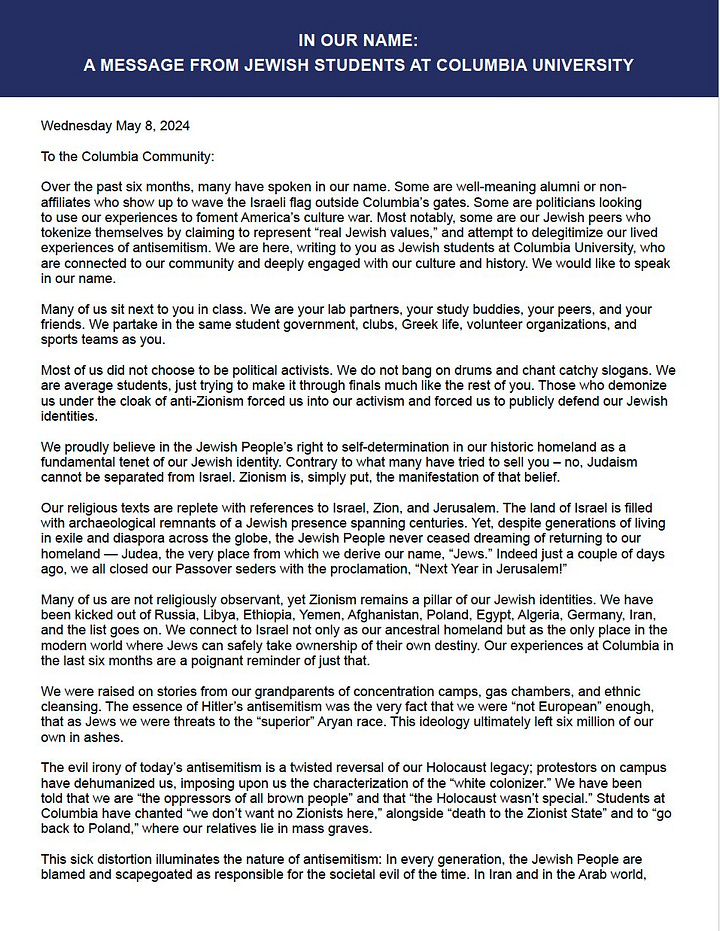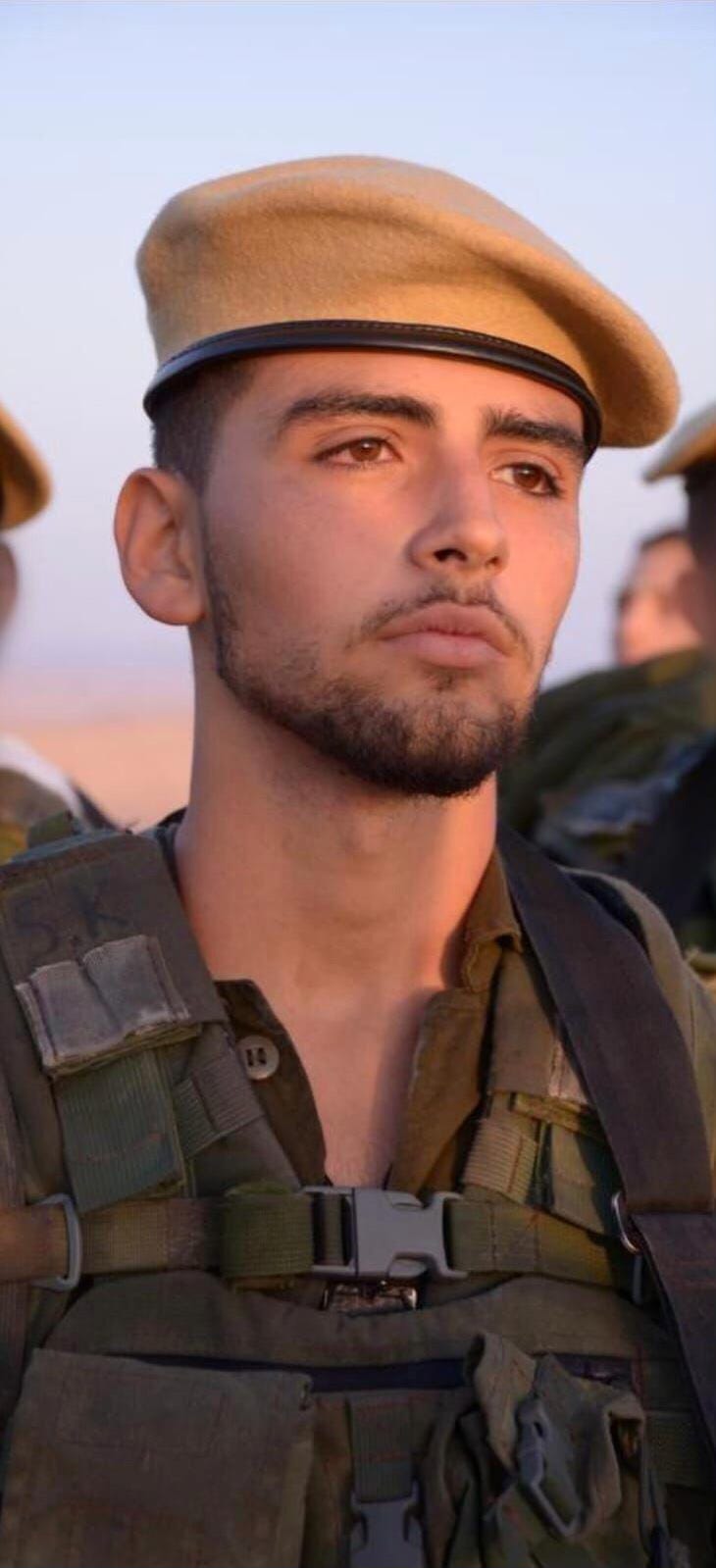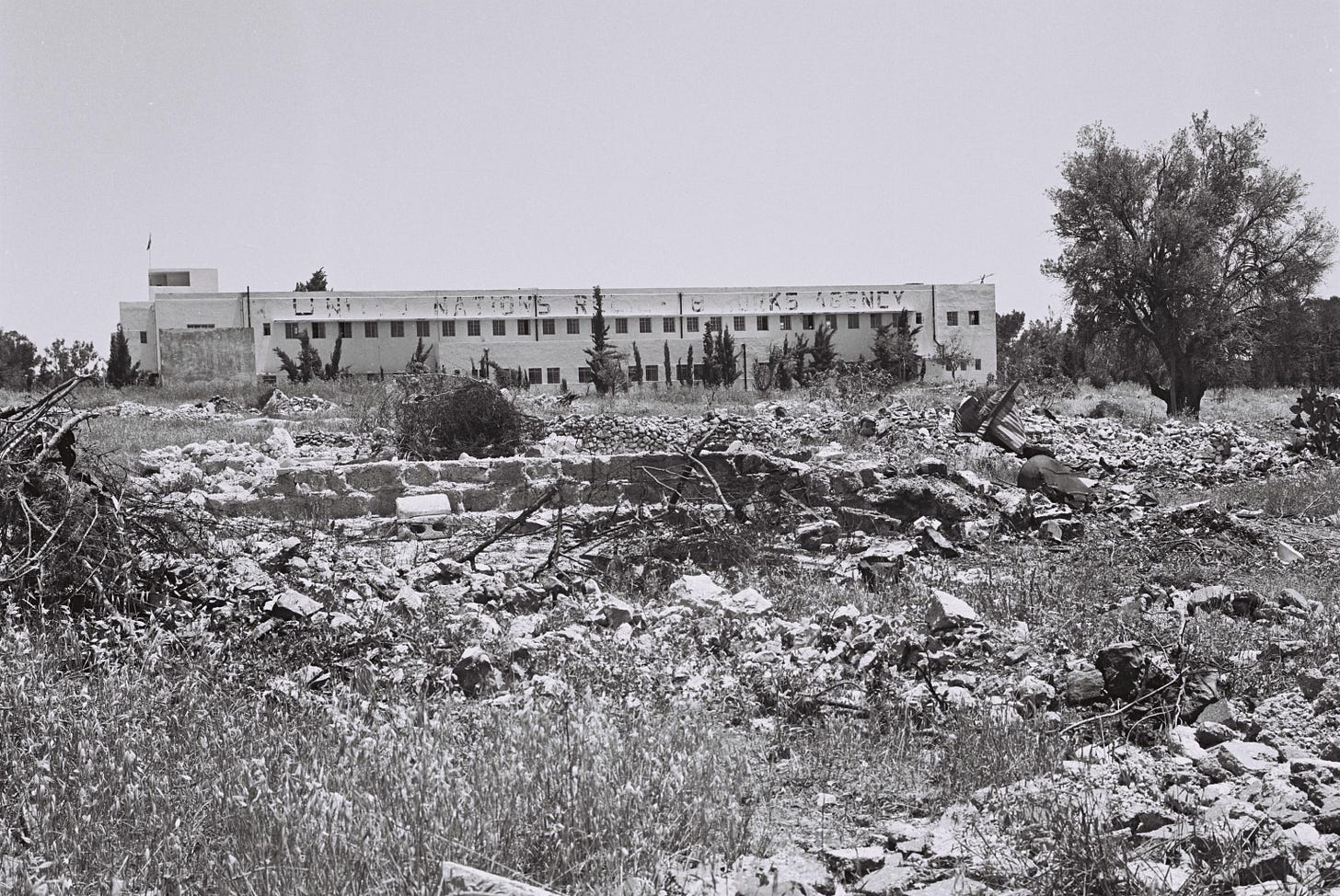DAY 216 OF THE WAR: Biden's Misguided Demand, Israel's Dilemma, Comptroller's Investigation, US Campuses
Tel Aviv Diary, May 9, 2024
The news in Israel has been dominated by President Biden’s statement, which aired on CNN last night in an exclusive interview with Erin Burnett:
I’ve made it clear to Bibi (Prime Minister Benjamin Netanyahu) and the war cabinet: They’re not going to get our support if they go into these population centers. Biden went on to say, I made it clear that if they go into Rafah... I’m not supplying the weapons that have historically been used to deal with Rafah, to deal with the cities, to address that problem.
Biden’s remarks followed yesterday's Secretary of Defense Lloyd Austin's statement indicating that specific bomb shipments were being withheld.
I believe it was a big mistake for President Biden to state his position publicly for three reasons. First, having done so indirectly weakens Israel. Any significant disagreement between the United States and Israel emboldens Iran and other mutual enemies.
Second, for those who believe President Biden's comments were politically motivated, it seems to have been a misstep because he risks alienating more moderate voters than he could potentially gain from the left wing.
Finally, and most importantly, Biden’s comments will likely have the opposite effect of what the President intended. Netanyahu, who has spent the last four months comparing Rafah to Stalingrad, will have difficulty publicly yielding to US pressure. Today, Netanyahu declared, “If we need to stand alone, we will stand alone.” He referenced the War of Independence when Israel did fight alone, although the arms purchased from Czechoslovakia were critical to our victory. However, in this war, our army fired an enormous amount of tank rounds, and overall, the amount of munitions we’ve used is immense. So, unless we learn to fight differently using less firepower (which I wish we could) and fight shorter wars, we will need constant resupply and always be dependent on foreign sources.
Thus, we are on the horns of an unpleasant dilemma. As of now, hostage negotiations are at a standstill, and any hope for an immediate release of the hostages has virtually vanished (though circumstances could, of course, change). CIA Director Bill Burns has left the region, and both Israeli and Hamas negotiators have left Cairo. If conquering Rafah would indeed end the war with the defeat of Hamas, I would be in full support. But since I haven’t spoken to anyone who believes that’s the case, difficult decisions must be made—decisions I am afraid this government is incapable of making.
This war has been just from the moment it began. However, as the old saying asserts, “It’s better to be smart than right,” has never been more applicable to our current situation. This war has been a strategic disaster for Israel. Killing another 2,000 Hamas members in Rafah will not alter that fact. It's time to figure out what will truly make a difference.
Here is a speech that then-Senator Joe Biden delivered at the AIPAC Conference in April 1992, which is relevant for two reasons. First, it clearly demonstrates Biden’s longstanding support for Israel. However, ironically, while discussing President George H. W. Bush’s actions, Biden reflects on the puzzling trend of politicians who fervently support Israel but change their stance once they assume the presidency.
ON THE BATTLEFIELD
On the northern border, it was another day of intense violence. Israel killed four Hezbollah members traveling in a car. Throughout the day, multiple missile and rocket attacks were targeting Israeli positions and towns along the border. Several rockets landed in Shlomi, damaging numerous homes. Today, it was announced that Staff Sergeant Haim Sabach (20) was killed yesterday, bringing the number of soldiers who have fallen since last Memorial Day to 760.
Three soldiers were killed on the Northern Front this week.
Three soldiers were wounded in the area of Rafah currently under our control when they entered a booby-trapped tunnel. IDF troops returned to the Zeitoon area in northern Gaza for the third time. The need to constantly return to areas already cleared by IDF forces is a direct result of this government’s lack of a plan for “the day after.”
INVESTIGATION INTO OCTOBER 7
The State Comptroller has been attempting to investigate the October 7th disaster but has faced pushback from the Chief of Staff, who claims it's the wrong time, and from the Prime Minister's office, which refuses to release information about the payments made to Hamas by Qatar at Israel's request. When the Comptroller began his investigation, I was skeptical, as he was known to oppose real-time investigations of anything and was clearly a Netanyahu appointee. However, seven months later, as no one else is engaging in any serious investigation, he is the only game in town.
CAMPUSES
The ongoing campus situation regarding Gaza continues to be a significant item in the news. Yesterday, I linked to several interesting articles about the impact of what is happening on the campuses. I have seen some articles and reports claiming that campus actions are not really antisemitism. Here is what Robert Reich wrote:
There may be some antisemites among demonstrators. Protest movements are often ignited by many different things and attract an assortment of people with a range of motives.
But after many talks with demonstrators and faculty, it seems clear to me this protest movement is centered on moral outrage at the killings of tens of thousands of innocent people in Gaza, most of them women and children.
It's clear that Jewish students on campuses disagree with Reich, and I thought I would include here the letters written by the two schools with which I have the closest affiliation. The first is a letter from a Jewish student at Columbia, a school from which I received both my undergraduate and graduate degrees.


Also related to Columbia, Ariel Beery, whom I heard on the “Markarim” podcast talking about his experiences at Columbia in the early 2000s and connected with, wrote an article in the Times of Israel called Blood For Oil in which he shows how oil money influenced the evolution of what has been going on at Campuses over the last 30 years. Beery also linked to an article I wrote six years ago about my experiences as a graduate student at Columbia, titled: BDS Personal Encounters over 30 Years.
The second student letter was written by the Head of the Jewish students at SUNY Purchase to the President of the College. I taught at SUNY Purchase for three years, so I feel a particular affinity for the school.



YOM HAZIKARON
We are approaching the most sacred day on Israel's calendar, Yom HaZikaron (Memorial Day for Israel's Fallen), which will begin at sundown on Sunday. Today, the AACI (Association of Americans and Canadians in Israel) holds its annual commemoration of those from North America who have fallen defending Israel. It was a somber ceremony, punctuated by the fact that until now, the memorial wall for North Americans who were killed in battle or terror attacks in Israel since 1920, spanning 103 years, contained 360 names. Since last year's Memorial Day, 73 names have been added. Many more Americans and Canadians are serving in the IDF today than ever before. During my IDF service in the mid-'70s, I had a side job helping immigrants. As a result, I knew almost every American serving.
BUSINESS
IAI
In most cases, Israel keeps the size of some of its arms sales secret. If you have been reading this newsletter for a while, you know I often share reports on sales, especially for Elbit, a public company that discloses its sales. Elbit’s releases usually mention an Asian country or a European country. However, significant information regarding Israeli Aerospace Industries (IAI) sales has recently emerged. According to statements by IAI, last year, India paid the company $631 million for missile and space systems, $202 million for radar, electronic warfare, and intelligence systems, and $94 million for drones. IAI also released its financial results for the first quarter, showing a rise in sales to $1.43 billion, an increase of 12%. This rise is almost entirely a result of increased sales to the IDF, which grew to $493 million, up 40% from last year. IAI is the main contractor for the Arrow system
.
XTEND
Israeli attack and intelligence drone manufacturer XTEND has raised $40 million in its third funding round (Series B), following the proven capability of its drones in complex urban warfare with IDF units during “Operation Iron Swords." The company has not disclosed its valuation following the fundraising, but industry sources suggest it has increased to $110 million.
What sets XTEND's drones apart is their intuitive control interface, which uses a joystick and virtual reality goggles that live stream the drone's point of view, making them easy for soldiers accustomed to video games to operate. Unlike competitors, XTEND's navigation interface allows the pilot to target a small point on the screen, and the drone autonomously flies towards it, navigating through buildings, tunnels, or carrying weights. Another advantage is the drones' modularity, allowing them to simultaneously operate with multiple operating systems, fly without GPS reception, and connect to optical fibers.
TOKEN SECURITY
The cybersecurity startup Token Security, which is developing a security platform for identities in cloud environments, has raised $7 million in a Series A funding round led by TLV Partners with participation from SNR Fund from San Francisco and private investors, including Shlomo Kramer, a pioneer of the cybersecurity industry in Israel and co-founder and CEO of Cato Networks, along with other cybersecurity entrepreneurs.
The token was founded last year by Itamar Appelbaum (CEO) and Ido Shlomo (CTO), 8200 alums who have worked together for over 15 years. The company has developed a platform for securing identities, focusing on non-human identities created and operated automatically by machines to enable them to communicate without human involvement. The arena into which the company is entering features many Israeli and foreign companies, including Asterix Security and Oasis.
PANAX
Panax Company has raised $10 million, led by Team8 Fund, with participation from TLV Partners. This is the company's second fundraising round, following an initial $5 million seed round in 2022 led by TLV Partners and other investors. Panax was established in 2022 and is developing a platform for finance teams to manage liquidity and treasury. Panax's founders are CEO Noam Mills, a former Olympic fencer representing Israel at the Beijing Olympics 2008, CTO Sefi Itzkovitz, and VP of Business Management Niv Yaar. The company employs 20 people, most of them in an office in Tel Aviv, and a new office is set to open in New York this summer.
–––––∞–––––∞–––––∞–––––∞–––––∞–––––∞–––––∞–––––
A PIECE OF HISTORY
The Six-Day War • DAY 2
While the Israeli Army had been very successful during the first day of the war in eliminating the first line of Egyptian defenses, the Egyptian army was largely still intact in the Sinai. The Israeli Army had anticipated a challenging day of fighting. The first part of the day was indeed difficult. One of the main objectives of the day was the Egyptian fortifications at Umm Qatef.
There was an intense battle, and when it ended, 40 Egyptian and 12 Israeli tanks were smoldering. Israeli infantry cleared three levels of Egyptian trenches, and by the end of the fight, 300 Egyptians were killed and another 100 wounded. But Israel suffered 14 dead and 41 wounded. Israeli forces then went on to conquer El Arish along the coast. From there, the forces were divided into three. One force continued down the coastal road toward the canal; a second headed south into central Sinai; and a third turned back to conquer Gaza, which they did in under a day.
However, for reasons disputed to this day, the order went out to Egyptian forces to retreat toward the canal. That retreat turned the day into a total route as Israeli forces swiftly advanced with limited opposition.
On the Jordanian front, Israel made one last plea to King Hussein to stop shelling, which he ignored. The order then went out to capture Jenin on the West Bank and surround the Old City. A Paratroop Brigade slated to join the fight against the Egyptians moved to Jerusalem overnight.
At 2 am, the assault began. The goal was to reach Mt. Scopus. Crossing the dividing line into the Jordanian side proved more difficult than expected, and seven Israeli soldiers were lost during that part of the battle. The Police Academy was the next target, but after a fight, it was captured. The next and most challenging target was Ammunition Hill. The battle for Ammunition Hill went on for three hours and was the war's bloodiest battle. 71 Jordanians and 35 Israelis died.
By the end of the second day, the Old City was almost surrounded.
.







Extremely disturbing reports by CNN about prisoner detention centres in the Negev. Are you able to write about these?